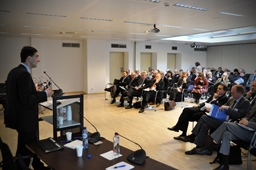
Delegates discuss experiences from and responses to the economic crisis at EFTA conference

On 16 November, the EFTA Parliamentary and Consultative Committees met for a joint conference on the economic and financial crisis in Europe. Two sessions with distinguished speakers focused first on EU policy responses to the crisis and then on lessons learned from small economies.
Svein Roald Hansen, Chair of the Parliamentary Committee, opened the conference. He highlighted the key issues and questions to be addressed and asked the speakers if they saw a way out of the crisis.
Edda Rós Karlsdóttir, an economist at the International Monetary Fund’s Resident Representative Office in Iceland, moderated the discussion.
Erik van der Plaats , Policy Coordinator at the European Commission, presented the EU’s main policy initiatives in tackling the crisis in the banking sector. In particular, he provided an insight into the proposal for the fourth Capital Requirements Directive, which will comprise a Directive governing access to deposit-taking activities and a Regulation governing how the activities of credit institutions and investment firms are carried out.
Zsolt Darvas , a Research Fellow at the Brussels-based think tank Bruegel, gave an overview of the key factors that led up to the crisis and commented on the various EU policy responses. He pointed out that more and stronger European integration would be necessary, with the strong involvement of the European Central Bank as a key factor in the medium term and more closely integrated fiscal policies in the long term.
In the second session, experiences from the crisis in Iceland, Norway and Switzerland were discussed as examples of how small economies had responded to the crisis.
Svein Harald Øygard , Director at McKinsey & Company and Head of the Central Bank of Iceland in 2009, commented on the banking crisis in Iceland. He drew on comparisons to the Nordic banking crises in the 1990s, pointing out that Icelandic policy makers and supervisory authorities had responded rapidly and efficiently through a series of policy measures to stabilise the situation. However, in spite of the good economic basis, resources and human skills available, he stressed that the foundations for future growth were weak, urging policy makers to establish a growth plan for the country.
Steinar Juel , Chief Economist at Nordea Bank, provided an insight into why the crisis had so far only affected Norway to a limited extent. Although the Norwegian economy had certain characteristics that made it less vulnerable to the crisis, Juel highlighted that the quick measures taken to provide stimulus and the rapid reduction in the interest rate had limited its impact. He also made the argument that learning from the past is crucial for taking rapid and appropriate actions when responding to new crises.
Boris Zürcher , Vice-Director at Avenir Suisse underlined that a swift and efficient response to the banking crisis by the Government and the Swiss National Bank was key in stabilising the banking sector, especially by equity injection into UBS Bank and the lowering of the interest rate. He discussed the debt crisis that led to the perception of the Swiss franc as a “safe haven”, resulting in a historically strong franc, and the Government’s response by setting a ceiling on the Swiss franc’s exchange rate at EUR 1.2.
The moderator summed up the debate by highlighting three key factors that were essential in resolving the current economic crisis and avoiding new ones in the future: good governance, prudent fiscal policies and strong institutions.
Mr Halldór Grönvold, Chair of the EFTA Consultative Committee, closed the conference on behalf of the two committees. He highlighted the importance of the social partners and the parliamentarians being involved in the process of finding adequate and efficient responses to the crisis, and in limiting its damage to societies and economies.